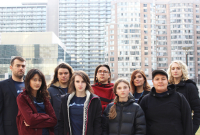Support strong Canadian climate journalism for 2025
The climate lawsuit Ontario’s Ford government would rather forget is going to hear from six environmental, Indigenous and other groups in addition to the seven young people who say its actions threaten their fundamental rights, the court ruled this month.
Indigenous Climate Action, the David Asper Centre for Constitutional Rights, the Assembly of First Nations, Friends of the Earth, the Canadian Association of Physicians for the Environment and For Our Kids were granted intervenor status in the legal challenge, the Superior Court of Justice said.
“I am delighted that these groups are now joining our case,” lead applicant Sophia Mathur said. “The more voices that can present the impact the climate crisis is having on communities across the province, the better our chances are that we can secure a victory and help build a safer, more sustainable future.”
The groups will be allowed to present 15-page factums on their specific contributions to the case (but no new evidence) and make 15-minute oral presentations during the proceedings, which are scheduled to take place in September.
The seven young people, backed by Ecojustice, argue that Premier Doug Ford’s weakened climate targets breach their constitutional right to life, liberty and security. Their case challenging a lack of government action to deal with climate change is the first such case to proceed to a hearing in Canada.
The Progressive Conservative government had sought to have the case dismissed, saying it would be impossible to prove harm, but that request was rejected in late 2020.
The government gutted existing climate targets after coming to power in 2018 as it dismantled a cap-and-trade emissions scheme and the green policies it helped fund.
Natalie Caine, a mother and organizer with the For Our Kids advocacy group, said the network would not let their children face the climate crisis alone.
“Our intervention in this case is one of the important ways parents are getting involved and supporting young people in this crucial moment in history,” Caine said. “We must curb climate change and create a safer future for all our kids.”
Rebecca Sinclair from Indigenous Climate Action said that gaps in Ontario’s climate policies “reflect their blind spots as a colonial government” and that Indigenous views “are structurally excluded from decision-making tables about future climate plans.”
“Indigenous sovereignty cannot be ignored, and we are so proud of our youth who are taking a legal stand to ensure Indigenous values and expertise are included in future climate policies and taking a stand for their future,” said Sinclair, the group’s director of education and programming.
Morgan Sharp / Local Journalism Initiative / Canada’s National Observer






Comments
That the people of Ontario gave this crew a second majority speaks to how poorly mainstream media is at reporting the real stories. Canadians jump on the war wagon regularly, heat themselves into a frenzy of patriotism whenever a foreign dust up is on offer...........but remain ignorant of the actual battle...and the very real war Conservative politicians and the fossil fuel industry are fighting daily against a livable earth.
God love these young people and brave climate organizations, but shame on the average Canadian who's main concerns are high gas prices and congested airports. Hoperfully a win for this group will help to wake us up.